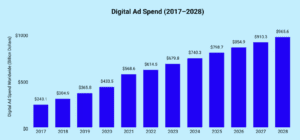There are over 250 types of marketing, and it’s bloody impossible to implement them all, so I thought I’d start a small, and possibly infrequent, series looking at different methods. I’ll explain what each one is, how to implement it, and offer some practical guidance. Let’s kick things off with one of my personal favourites: Persuasion Marketing.
Persuasion Marketing: What is it?
Persuasion marketing is all about leveraging psychology to influence how people engage with brands, products, or ideas. By getting to the root of why people behave the way they do, marketers and business owners can build campaigns that resonate emotionally and drive real action. It’s a science-and-art combo, backed by research and day-to-day practicality. Loads of businesses swear by it for boosting sales and keeping customers around for the long haul.
Why bring this up?
I was listening to a podcast recently, and the guest was talking about how their business took off. They were basically describing persuasion marketing without calling it that, which got me thinking, “Hang on, this is something we do with nearly all of our clients, so maybe I should break it down in my own words.”
What I plan to do is:
- Cover the basics, so you can get your head around the core principles,
- Toss in some stats to show why it works,
- Highlight who’s using it well,
- Show you real-world examples,
- And flag some ethical considerations so you don’t slip into shady tactics.
The Foundations of Persuasion Marketing
Dr Robert Cialdini is the go-to guy in this field. He’s an American psychologist and marketer who identified six main principles of influence: reciprocity, commitment and consistency, social proof, authority, liking, and scarcity. These principles highlight how subtle tweaks in your messaging or design can totally change how people decide to buy. For example, using social proof could be as simple as sharing customer testimonials or reviews, tapping into the natural urge to follow the crowd. Scarcity, on the other hand, might mean limited-time offers or “Only 2 left in stock,” nudging buyers to act faster.
A Few Stats to Consider
As online channels get more advanced, persuasion marketing has blown up. Statista reports that global advertising spend keeps climbing, mainly because businesses are keen to fine-tune targeted messaging and get more personal with their audience. It’s also expected to keep rising!

Meanwhile, the Harvard Business Review found that 95% of purchasing decisions are driven by subconscious urges, so emotional hooks really matter. If you think about it, that alone shows how critical persuasive tactics can be.
What the Big Names Say
Famous entrepreneurs often harp on about the power of personal, genuine communication. Sir Richard Branson once said, “A good PR story is infinitely more effective than a front-page ad.” In other words, crafting compelling narratives can be far more impactful than just plastering an ad. Seth Godin (my all-time favourite marketing guru) famously stated, “People do not buy goods and services. They buy relations, stories, and magic.” Both quotes point to the same truth: winning hearts and minds is all about connecting on a human level, not just pushing features.
Real-World Examples
You can see persuasion marketing everywhere, especially on social media. Think of promoted posts that seem to speak directly to your interests, or video ads that follow you around after you visit a website. Brands doing this well often rely on heavy data analysis to see what you like, then serve you hyper-targeted messages. One caveat: you have to be transparent about data use. People are more protective of their personal info these days, so pushing too far can blow up in your face.
Ethical Considerations
Yes, persuasion marketing is powerful, but it comes with a responsibility to do it right. If you stretch the truth or over-promise, you might get a quick win, but you’ll risk damaging your reputation in the long run. Plenty of companies now have ethical guidelines or aim for B-Corp status to make sure they use persuasive techniques without crossing the line. Respecting people’s privacy and autonomy isn’t just good for your conscience, it’s good for business.
Wrapping Up
Persuasion marketing sits at the crossroads of science and creativity. It hinges on an understanding of basic human psychology to shape how you communicate, making your messages more likely to stick. Successful campaigns don’t just boost your numbers, they forge genuine emotional connections with customers. Going by Sir Richard Branson and Seth Godin’s insights, the real power is in the story you tell and the relationship you build. By mixing ethical practices with a human touch, persuasion marketing can fundamentally change how brands speak and how consumers respond.
Cheers,
Tom Stansfield


